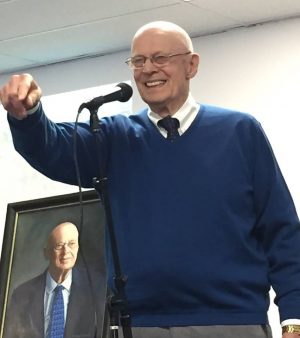Robert’s Rules succeed in high school classroom
 Guest post by Wayne Jennings, Ph.D.
Guest post by Wayne Jennings, Ph.D.
Jurassic Parliament is delighted to share this real-life example of how the students of Wayne Jennings, an innovative high school teacher, brought Robert’s Rules alive in their classroom.
Meetings in schools
Meetings involve a group in making important decisions. At the student-group level, elected or volunteer student officers run the meeting. Every student has an opportunity to propose actions, talk for or against proposals, and vote on their dispositions—democracy in action. Meetings are run by the rules of parliamentary procedure or other established procedures, thus ensuring that each person has equal rights and voice. Meetings build skills for decision-making in organizations. Schools now have student councils that make decisions, but few decisions affect the operation of the school.
Students learn when they take real responsibility
We live in a democracy, and schools must train students for active adult roles, with students learning that complexity, differing views, and thoughtful consideration can shape better decisions. Students learn, for example, to delegate responsibility to subcommittees for researching, preparing findings, and making recommendations for the main body’s consideration. They learn to parse intricate issues and to arrive at a range of solutions.
The energy and idealism of students in meetings transform their understanding of an institution and exposes what needs to be done and how to do it. The governance of the school can become its own miniature society—in effect, a small democracy. In this way, students participate in meetings and provide input by submitting petitions and introducing resolutions. Effective meetings shape lifelong change.
Students hold weekly class meetings
I held this viewpoint as a teacher. My classes held weekly meetings. Students elected officers, ran meetings using Robert’s Rules of Order, established subcommittees, wrote a constitution preamble, and made important decisions about our class. At the end of year, I set a final exam (required by the district) as a simulation, with a handout thanking the class members for attending this meeting to address environment problems of clean air.
Final exam led by a quiet student
My instructions were simple. Hold a meeting to organize and propose actions. I said I would sit, take notes, and just observe, intervening only if necessary. (As it turned out, I didn’t need to.) I took a big chance by selecting Jerry Allen (first name alphabetically) to be the convener. Jerry had held back from participating in class activities for most of the year and had expressed little interest. On being selected as the chair for the exam, he sat up straight before the class and said in a loud voice, “Thank you for coming, and you all know why we’re here. We’ll now conduct an election for chair. Are there any nominations?” His demeanor and logic brought tears to my eyes. Clearly, he had been listening and learning during the year and rose to the occasion.
Principal couldn’t tear himself away
The class elected officers, established committees, gave them time to work, and then listened to their reports, which were delivered using graphics and skits. I had invited our principal to observe. He came, saying he could only stay a few minutes. He stayed the entire two-hour period. I was immensely proud of the class and not immodestly of my teaching. My constant purpose during the year, to help students become able and responsible citizens with the attendant skills and knowledge, was on my mind for every activity.
To learn more about how to do this, read Jurassic Parliament’s article, Let’s teach our kids Robert’s Rules, by Ted Weisgal, available here, and purchase the book, Robert’s Rules for Kids and Big Kids, available here.
Excerpted with permission from School Transformation. © 2018 Wayne Jennings. All rights reserved.
About Wayne Jennings After serving in the U.S. Army, Wayne Jennings became a teacher, principal, school board chair, and district staff trainer. During his career, he started eight schools from scratch including a K-12 experimental school, two schools for at-risk students, and a theater arts school. Wayne recently received the John Dewey Award for his career use of using experiential methods to engage students. After retirement, Wayne wrote School Transformation to help design effective, humane schools for the new era we occupy.

 Guest post by Wayne Jennings, Ph.D.
Guest post by Wayne Jennings, Ph.D.